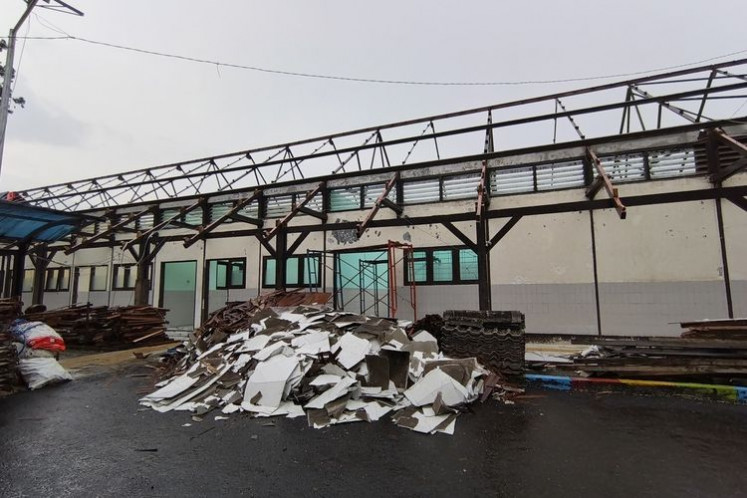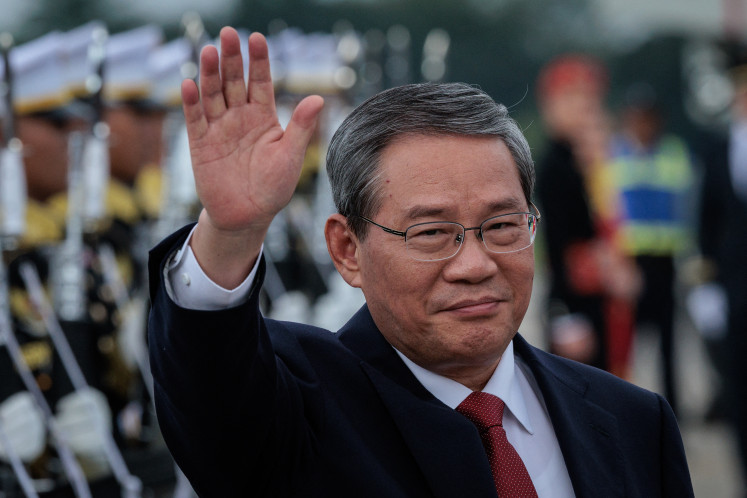Govt seeks to boost CNG use by motorists
The government expects to persuade vehicle owners to switch to gas as a fuel by establishing hundreds of new compressed natural gas (CNG) stations across the country
Change text size
Gift Premium Articles
to Anyone

T
he government expects to persuade vehicle owners to switch to gas as a fuel by establishing hundreds of new compressed natural gas (CNG) stations across the country.
The Energy and Mineral Resources Ministry has recently issued Ministerial Decree No. 25/2017 on the acceleration of gas fuel for transportation, which is the basis for the ministry’s plan to construct an additional 221 CNG stations and mandates the installation of CNG dispensers at 150 conventional filling stations in Java by 2020.
At the moment, there are only 68 CNG stations, 46 of which were constructed using state funds.
The ministry’s oil and gas director general IGN Wiratmaja Puja said the government hoped the increased availability of CNG fuel would convince motorists to move away from conventional fuels, almost half of which is imported due to skyrocketing demand.
“We want to boost the consumption of CNG on a massive scale from the supply side. Furthermore, the price [of CNG] remains much lower than conventional fuels even though its octane rating is higher than [subsidized gasoline] Premium and equal to that of Pertamax,” he said during a press conference on Tuesday.
CNG is touted as having an equivalent octane rating (RON) to state-owned oil and gas firm Pertamina’s Pertamax, which has an RON of 90, and lower carbon emissions than other fossil fuels.
The price is set at Rp 3,100 (23 US cents) per liter. Meanwhile, Pertamax costs Rp 8,050 per liter in Java and Bali, and Premium costs Rp 6,450 per liter.
Indonesia is far behind other countries when it comes to CNG consumption. For example, around 4 million vehicles were recorded as using CNG in Iran last year, with 2,350 CNG stations in operation.
Neighboring Thailand currently has 470 CNG stations serving around 462,000 vehicles across the country.
The Indonesian government’s efforts to convert consumers started in 2012, but to little avail so far.
Data from Pertamina show that gas use by vehicles only increased by 5.26 percent to 4 million standard cubic feet per day (mmscfd) in 2016 from the previous year.
Although the new ministerial decree makes it compulsory for all conventional gas stations to install CNG dispensers, the Energy and Mineral Resources Ministry has only included 150 gas stations owned by Pertamina within its road map.
The government is upbeat that private firms will want to join in the CNG business, especially since the decree stipulates that the transport of CNG for fuel will be exempted from additional costs, such as toll fees.
In addition to establishing a roadmap to increase the availability of CNG, the ministry has allocated more than Rp 178 billion to provide 8,900 free converter kits in its attempt to entice more vehicle-owners to move away from gasoline.
It will distribute the converter kits to both government vehicles and the public.
The Association of Fuel Station Owners (Hiswana Migas) has applauded the ministry’s initiative to increase the availability of CNG fuel, but secretary general Syarif Hidayat said fuel station owners might still be cautious because the investment required for CNG station construction and gas dispenser installation was huge.
The association estimates that an additional gas dispenser costs around Rp 13 billion to Rp 15 billion.
“A solution for this must be considered if the Energy and Mineral Resources Ministry continues to insist that each gas station must have one dispenser,” he told The Jakarta Post.
Better synergy was required among the Energy and Mineral Resources Ministry, the Transportation Ministry and the Industry Ministry to successfully persuade motorists to use CNG, Syarif said, including by making it compulsory for automotive manufacturers to produce CNG-powered public transportation.
ReforMiner Institute researcher Pri Agung Rakhmanto added that fuel station owners might need additional incentives in the program as the current CNG prices were economically unfeasible.
“While [the prices] might be low for the public, they are too low for companies, especially compared to Premium which is only around Rp 7,000 [sic]. There is still some space for additional incentives,” he said.









